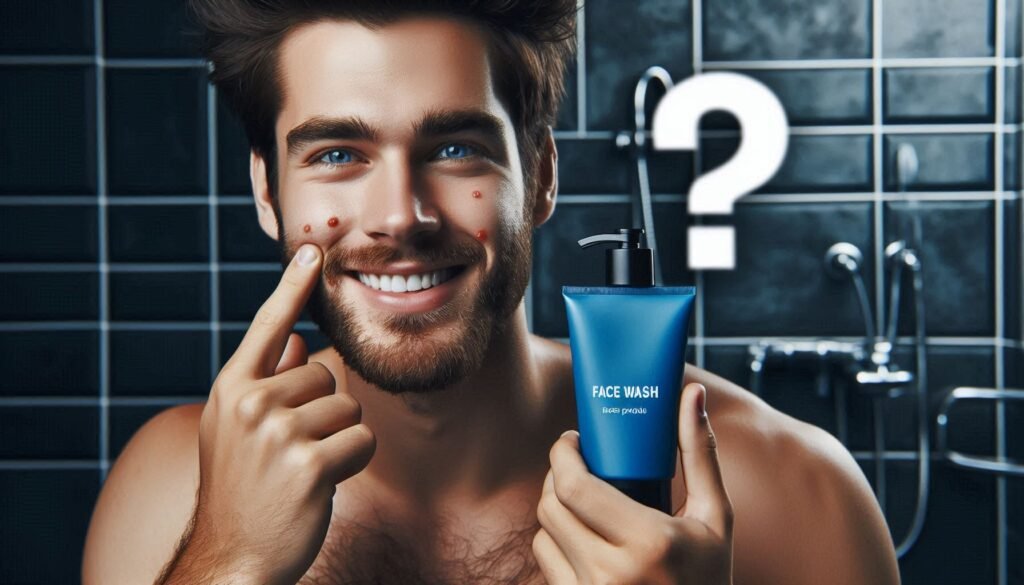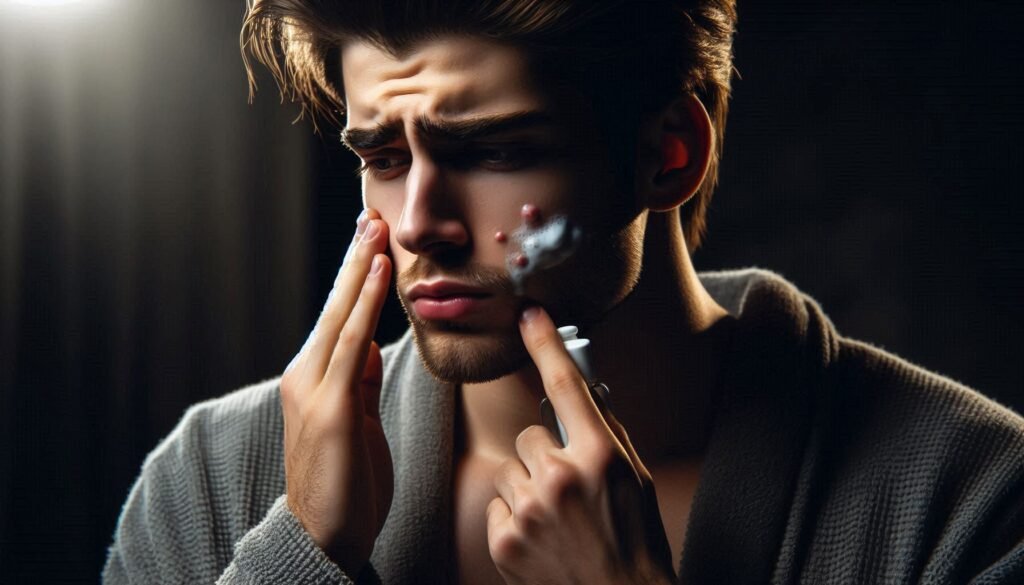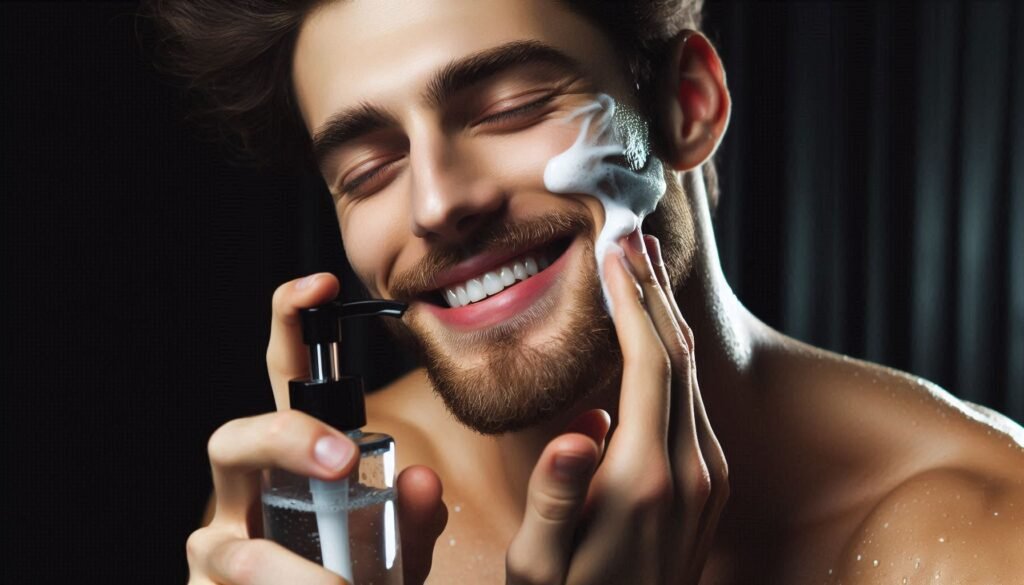
Table Of Contents:
(Click And Go Directly)
Dealing with acne can be frustrating, especially when it feels like every product you try only makes things worse. The right face wash can make a significant difference in your skincare routine, helping to clear your skin without causing irritation Also Proper skincare and products designed for acne-prone skin can help manage these breakouts effectively.
This guide will help you understand how to choose a face wash for acne-prone skin, focusing on effective ingredients, proper usage, and tips for achieving clearer skin.
1. What Is Acne-Prone Skin?
Acne-prone skin refers to skin that is more susceptible to developing pimples, blackheads, and whiteheads due to excess oil production, clogged pores, and bacteria buildup. This skin type is often reactive to environmental factors and certain skincare products, leading to frequent breakouts. People with acne-prone skin may experience both inflammatory acne (red, swollen pimples) and non-inflammatory acne (blackheads and whiteheads).
Key Characteristics Of Acne-Prone Skin:
- Frequent Breakouts– Regular occurrences of pimples, blackheads, and whiteheads.
- Excess Oil Production– Skin tends to be oily, especially in the T-zone.
- Clogged Pores– Pores are often blocked by excess oil, dirt, and dead skin cells.
- Inflammation– Redness, swelling, and irritation are common due to inflamed pimples.
- Sensitive To Products– Reacts easily to certain products, leading to irritation or more breakouts.
- Post-Acne Scarring– Acne-prone skin is often left with dark spots or scars after breakouts heal.
2. Why Face Wash Is Important For Acne-Prone Skin?

The skin on your face is delicate, and when it comes to acne, using the wrong products can exacerbate the problem. Here’s why choosing the right face wash is crucial for acne-prone skin:
- Removes Impurities: A good face wash cleanses your skin of dirt, oil, and impurities that can clog pores and lead to breakouts.
- Prevents Over-Drying: The wrong face wash can strip your skin of its natural oils, causing irritation and making acne worse.
- Balances Skin’s pH: Proper cleansing helps maintain your skin’s natural pH balance, which is essential for healthy skin.
Without the right face wash, acne-prone skin can become even more aggravated, leading to increased breakouts, irritation, and discomfort.
3. What To Look For In A Face Wash For Acne-Prone Skin

When choosing a face wash for acne-prone skin, there are several key features and ingredients to consider:
a. Identify Your Skin Type
The first step in choosing the right face wash for acne-prone skin is to understand your skin type. Acne-prone skin can fall into several different categories, and identifying yours will help you select a cleanser that addresses your unique needs.
Here are the common skin types:
- Dry Skin: Feels tight, may have flaky patches, and is prone to irritation.
- Oily Skin: Often looks glossy, has larger pores, and is more prone to breakouts from excess oil.
- Combination Skin: Oily in the T-zone (forehead, nose, chin) and dry in other areas.
- Sensitive Skin: Easily irritated, may quickly react to harsh products, showing signs of redness.
How To Identify Your Skin Type:
- Wash your face with a gentle cleanser and pat it dry.
- Leave your skin bare for about an hour without applying any products.
- After the hour, check how your skin feels:
- If your skin is shiny and greasy all over, you likely have oily skin.
- If your skin feels tight and dry, you likely have dry skin.
- If your T-zone is oily but your cheeks feel dry, you probably have combination skin.
- If your skin feels irritated or shows redness, you might have sensitive skin.
Identifying your skin type is crucial for picking the right face wash, especially if you’re dealing with acne. Understanding whether your skin is producing too much oil, is dehydrated, or is easily irritated will guide you toward the best product for managing breakouts.
b. Look For Non-Comedogenic Products
Choose face washes labeled as non-comedogenic, which means they won’t clog your pores. This is vital for preventing breakouts and keeping your skin clear.
c. Key Ingredients To Consider
Certain ingredients can effectively treat and prevent acne. Here are some beneficial ones:
- Salicylic Acid: A beta hydroxy acid (BHA) that penetrates deep into the pores, helping to exfoliate and unclog them.
- Benzoyl Peroxide: Kills acne-causing bacteria and helps reduce inflammation.
- Tea Tree Oil: A natural antibacterial ingredient that can reduce redness and swelling.
- Glycolic Acid: An alpha hydroxy acid (AHA) that exfoliates the surface of the skin, helping to prevent clogged pores.
- Niacinamide: Helps to reduce inflammation and redness, making it ideal for sensitive, acne-prone skin.
d. Gentle Formulations
Avoid harsh scrubs or face washes with abrasive beads, as they can irritate your skin and worsen acne. Look for gentle, sulfate-free cleansers that clean without stripping your skin’s natural moisture.
e. PH-Balanced Products
A face wash with a pH-balanced formula helps maintain your skin’s natural barrier. A pH of around 5.5 is ideal for skin health.
f. Foam vs. Gel vs. Cream
Face washes come in various textures, including gel, cream, and foam. Here’s a breakdown of which might work best for you:
- Gel- Best for Oily and acne-prone skin; provides a deep clean.
- Cream- Best for Dry or sensitive acne-prone skin; hydrates while cleansing.
- Foam- Combination skin; lightweight and easy to rinse.
4. What To Avoid In Face Wash For Acne-Prone Skin

When choosing a face wash for acne-prone skin, it’s equally important to know which ingredients to avoid. Some ingredients can worsen your acne or irritate your skin further. Here are the top ones to steer clear of:
1. Sulfates: Sulfates are strong cleansing agents often found in face washes. They create a rich lather, but they can be too harsh for acne-prone skin by stripping away natural oils. This can lead to irritation, leaving your skin more vulnerable to breakouts.
2. Alcohols: While alcohol is often added to dissolve oil and grime, it can over-dry your skin, causing it to produce more oil to compensate. This can clog pores and aggravate acne.
3. Heavy Oils: Some oils, especially those not labeled as non-comedogenic, can clog pores. While oil-based cleansers can be beneficial, avoid mineral oil or coconut oil, which are likely to block pores and trigger breakouts.
4. Synthetic Fragrances And Dyes: Artificial fragrances and dyes can irritate acne-prone skin, causing inflammation, redness, and worsening breakouts. Opt for fragrance-free and dye-free options whenever possible.
| Avoid These Ingredients | Why They’re Bad |
|---|---|
| Sulfates | Strip away natural oils, leading to irritation. |
| Alcohol | Over-dries skin, triggering more oil production. |
| Heavy Oils | Can clog pores and worsen breakouts. |
| Fragrances & Dyes | Irritate sensitive skin, causing inflammation. |
5. Steps To Choose A Best Face Wash For Acne-Prone Skin

Choosing the right face wash for acne-prone skin can be challenging, but following these steps can help you make the best choice:
Step 1: Consider Your Skin Type
Even though you have acne-prone skin, you may also have dry, oily, or combination skin. Choose a face wash that suits both your acne and your skin type. For instance, if you have dry skin, go for a hydrating cleanser; for oily skin, pick an oil-control face wash.
Step 2: Look For Acne-Fighting Ingredients
Choose a face wash that contains ingredients known for fighting acne, such as salicylic acid, benzoyl peroxide, or tea tree oil. These ingredients work to unclog pores, kill acne-causing bacteria, and reduce inflammation.
Step 3: Choose Non-Comedogenic Products
Always select face washes labeled non-comedogenic, which means they won’t clog your pores. This is essential for preventing further breakouts and keeping your skin clear.
Step 4: Check For Gentle, Soothing Ingredients
Since acne-prone skin is often sensitive, look for calming ingredients like aloe vera, chamomile, or niacinamide. These can help soothe irritation, reduce redness, and calm inflammation.
Step 5: Avoid Harsh Chemicals
Stay away from harsh ingredients like sulfates, alcohol, and artificial fragrances. These can irritate acne-prone skin, strip away natural oils, and worsen breakouts.
Step 6: Test The pH Balance
Opt for a face wash with a balanced pH level (around 5.5). A pH that is too high or too low can disrupt your skin’s natural barrier, making it more prone to acne and irritation.
Step 7: Patch Test New Products
Before fully incorporating a new face wash into your routine, do a patch test on a small area of your skin. This ensures that the product doesn’t cause irritation or new breakouts.
6. How To Apply A Face Wash On Acne-Prone Skin

Using your face wash correctly is just as important as choosing the right one for your acne skin. Here’s a step-by-step guide:
1. Wash Your Hands
Before touching your face, make sure to wash your hands thoroughly to avoid transferring bacteria.
2. Wet Your Face
Use lukewarm water to wet your face. Hot water can strip your skin of natural oils, while cold water may not cleanse as effectively.
3. Apply The Face Wash
Use a small amount of your chosen face wash. Gently massage it onto your skin in circular motions for about 30 seconds. Avoid scrubbing, as this can irritate your skin.
4. Rinse Thoroughly
Rinse your face with lukewarm water to remove all traces of the cleanser. Ensure no product is left on your skin.
5. Pat Your Skin Dry
Use a clean towel to pat your face dry. Avoid rubbing, as this can irritate acne-prone skin.
6. Follow Up With Treatment
If you use any acne treatment products, apply them after cleansing to ensure maximum effectiveness.
Simple Face Wash Routine:
Here’s a simple face wash routine tailored for acne-prone skin that can help maintain clear and balanced skin:
1. Morning Routine: Start your day with a gentle acne-fighting face wash. Look for ingredients like salicylic acid or benzoyl peroxide that target breakouts. Follow up with an oil-free moisturizer to keep your skin hydrated and a broad-spectrum sunscreen to protect from UV rays.
2. Evening Routine: In the evening, cleanse your face again to remove dirt, oil, and any leftover makeup or sunscreen. After cleansing, apply a non-comedogenic night cream or lightweight moisturizer to nourish your skin overnight without clogging pores.
| Time of Day | Face Wash Routine |
|---|---|
| Morning | Cleanse, apply an oil-free moisturizer, and use sunscreen. |
| Evening | Cleanse and follow with a non-comedogenic moisturizer or night cream. |
7. Top 5 Face Washes For Acne-Prone Skin

Here’s a list of some popular face washes that are great for acne-prone skin:
1. Neutrogena Oil-Free Acne Wash
Contains salicylic acid to help clear breakouts without drying out the skin.
2. Cetaphil Pro DermaControl Foam Wash
A gentle foam cleanser that removes excess oil and helps reduce acne breakouts.
3. La Roche-Posay Effaclar Medicated Gel Cleanser
Combines salicylic acid and glycolic acid for effective cleansing and exfoliation.
4. CeraVe Foaming Facial Cleanser
Contains ceramides and niacinamide, suitable for normal to oily skin, maintains the skin barrier.
5. AcneFree Oil-Free Purifying Cleanser
Features benzoyl peroxide to combat acne while being gentle on the skin.
Conclusion
Choosing the right face wash for acne-prone skin is essential for achieving clear and healthy skin. By focusing on non-comedogenic products with beneficial ingredients like salicylic acid and niacinamide, you can cleanse your skin effectively without causing irritation.
Remember to use your face wash properly and maintain a consistent skincare routine for the best results. With patience and the right products, you can take control of your acne and enjoy clearer, healthier skin.
FAQs
So You have gotten all the answers about how to choose a face wash for acne-prone skin, or how to choose a face wash for acne-prone skin for men, or how to choose a face wash for acne-prone skin that suits your face…
Like This Also Read- How To Choose A Moisturizer For Acne Prone Skin: A Complete Guide









